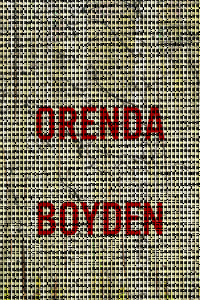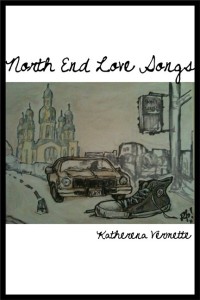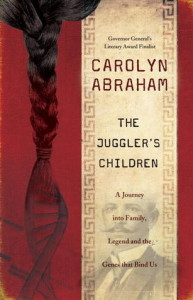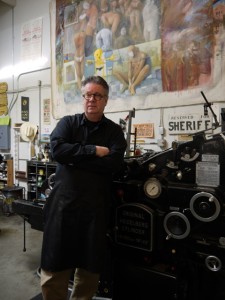"I don't have a computer. I don't have an Internet. I don't have the e-mail. I don't have any of that shit."
Read MoreBURN PILE: Card catalogs, hungover bears, and "snowfalling" Dave Eggers
Among other things, an ursine protagonist ponders gender expectations and the quality of his sex life alongside forest companions like Entitled Fox and Self-Righteous Hawk
Read MoreBURN PILE: Canada offers up top crop of GG finalists
 I'm guessing most Americans are unfamiliar with the term "GGs", but to Canadians it's shorthand for the pinnacle of Canadian literary awards. The Canada Council for the Arts announced the list of finalists for the 2013 Governor General’s Literary Awards yesterday. The GGs are awarded in both official languages, in seven categories: fiction, poetry, drama, non‑fiction, children’s literature (text and illustration) and translation. And this year, the finalists for this prestigious award are outstanding.
I'm guessing most Americans are unfamiliar with the term "GGs", but to Canadians it's shorthand for the pinnacle of Canadian literary awards. The Canada Council for the Arts announced the list of finalists for the 2013 Governor General’s Literary Awards yesterday. The GGs are awarded in both official languages, in seven categories: fiction, poetry, drama, non‑fiction, children’s literature (text and illustration) and translation. And this year, the finalists for this prestigious award are outstanding.
“Get ready for late nights!” said Robert Sirman, Director and CEO of the Canada Council for the Arts. “Great books abound among this year’s GG finalists and you won’t be able to put them down. Further proof of the prolific and potent Canadian literary scene.”
Which is exactly what you'd expect the top administrator of Canada's top arts organization to say, except in this particular case he's correct. Here are a few highlights from the English language list:
In the fiction category, there's Joseph Boyden's latest novel, The Orenda, (which is also a nominee for the Scotiabank Giller Prize). It is a 500-page epic full of blood, beauty and magic set in Canada’s earliest days. The Toronto Star calls it a "sweeping and ambitious new novel" set amid the 17th-century clashes involving Jesuit missionaries, the Huron and the Iroquois that marked Canada’s early beginnings. Boyden, who has Irish, Scottish, and Métis roots, says this particular story has been inside him waiting to be told for so long that it is “part of my DNA.” Click here to read a review in the Toronto Star and listen to Boyden read from The Orenda.
 Boyden is no stranger to accolades. His first novel, Three Day Road, received the Rogers Writers’ Trust Fiction Prize, the Amazon/Books in Canada First Novel Award, and the McNally Robinson Aboriginal Book of the Year Award, and was shortlisted for the 2005 Governor General's Award for Fiction. His second novel, Through Black Spruce, the second in a trilogy he started with Three Day Road, won the 2008 Scotiabank Giller Prize.
Boyden is no stranger to accolades. His first novel, Three Day Road, received the Rogers Writers’ Trust Fiction Prize, the Amazon/Books in Canada First Novel Award, and the McNally Robinson Aboriginal Book of the Year Award, and was shortlisted for the 2005 Governor General's Award for Fiction. His second novel, Through Black Spruce, the second in a trilogy he started with Three Day Road, won the 2008 Scotiabank Giller Prize.
Unlike Boyden, Metis-Mennonite poet Katherena Vermette is a fresh face on the list of GG finalists. Her debut collection North End Love Songs combines, according to a review in Prairie Fire, "elegiac and fiercely ecstatic melodies to sing of a complicated love for a city, a river, and a neighborhood. It is deeply rooted in its location, yet will reach out to readers everywhere with its harsh and beautiful tunings of growing up female in Winnipeg’s North End."
Vermette already won one award this year, the 2013 Lina Chartrand Poetry Award for her activist poems,” blue jay”, “red bird” and “cedar wax wing” (published in V.35 Issue 1 of CV2). The Lina Chartrand Poetry Award award was created to recognize an emerging poet as a tribute to the spirit of activist-poet Lina Chartrand’s life and work, and to celebrate women’s achievements in writing. (Click here to watch/hear Vermette read from North End Love Songs.)
 Like many Canadians, Carolyn Abraham is an immigrant. Born in England, she moved to Canada with her family in 1972, bringing with her a fascinating family history ripe for the telling. It this that fills the pages of her second book, The Juggler's Children, a stunning book about tracing her family’s history through DNA analysis. According to a book review in the Globe and Mail, "The Juggler’s Children is many things, each one spellbinding: a thrillerish quest for origins, a continent-spanning travelogue, and an eye-opening foray into the annals and ethics of genetic science."
Like many Canadians, Carolyn Abraham is an immigrant. Born in England, she moved to Canada with her family in 1972, bringing with her a fascinating family history ripe for the telling. It this that fills the pages of her second book, The Juggler's Children, a stunning book about tracing her family’s history through DNA analysis. According to a book review in the Globe and Mail, "The Juggler’s Children is many things, each one spellbinding: a thrillerish quest for origins, a continent-spanning travelogue, and an eye-opening foray into the annals and ethics of genetic science."
It should come as no surprise that Abraham uses DNA to help unravel the mystery of her family story: She was a medical reporter for many years, which led to her first book, Possessing Genius: The Bizarre Odyssey of Einstein’s Brain, a finalist for the 2002 Governor General’s Award for Non-fiction.
BURN PILE: Modernism-induced head-scratching edition!
An essay on re-engaging the challenges of modernism, a 1922 review of Ulysses, and what Marilynne Robinson means by "keeping her organism out of trouble."
Read MoreBURN PILE: Franzenfreude edition
Jonathan Franzen's technoconsumerism essay prompts a Tumblr blog, the number of independent bookstores has grown during the past five years, and even isolated artists need an audience
Read MoreBURN PILE: CutBank/Community
 “Missoula: A community that is as resilient
and diverse as the biology that surrounds it.
A gift from the Universe!”
“Missoula: A community that is as resilient
and diverse as the biology that surrounds it.
A gift from the Universe!”
Check out what Missoula wrote this summer!
Read MoreBURN PILE: Mistakes, hour glasses, and J. Robert Lennon animated
Watch a single-sentence from J. Robert Lennon's "Hibachi" animated; send your essays on babies and mistakes to Creative Nonfiction; gather your fiction and poetry manuscripts
Read MoreBURN PILE: Welcome to title-land!
Jhumpa Lahiri's latest, Man Booker-nominated, novel has a fashionable title; Fear of Flying turns 40; and William Carlos Williams wants you to leave his lemons alone
Read MoreBLOG: Fiction editor C. Sanderson meets cowboy surrealist Peter Koch
by Candie Sanderson This summer, needing a break from the dry 90+ heat of the Missoula summer, I traveled to California and resumed my old job in the East Bay: selling original vintage posters. This meant going back to where it all started, this American thing: California was the first state I visited, the first I lived in, the one I'd return to. There, nestled in the fog and underneath the towering bridge, is a group of generous artists and writers, die-hard revolutionaries and bon vivants, who, like poster artist David Lance Goines, stood proudly next to Mario Savio during the Free Speech Movement, and talked about surrealism when conformists were trying to bury it. Who would have thought that among them I would find a Montana native?
The first time I entered Peter Koch's sanctuary – a very private printing shop on the Fourth Street corridor in Berkeley – I knew nothing yet about Missoula's infamous cowboy surrealist. I was intimidated: entering Peter Koch's shop is stepping into a world of fine craftsmanship and bold artistry, with a guide who is nothing short of a legend. Peter Koch has worked for libraries, museums, universities. He has published and printed books of philosophy, poetry and literature – all the way to the Ancient Greek. His work, sophisticated, difficult, has been exhibited in places such as the New York and the San Francisco Public Libraries. On the walls of his shop, I saw beautiful poems in intricate types, brown sheets of handmade paper meant to imitate leather, black and white pictures of buffaloes and Native Americans printed on a paper so thin and fine the images seemed to be holding ghosts. These were no other than the pages of Missoula writer and UM faculty member Debra Earling's Lost Journals of Sacajewea. Little did I know that I would be sitting in one of her classes a year later.
Peter Koch embodies a dandier Missoula: one that was versed in counterculture, full of literary mavericks, modern-day pioneers, and cowboy surrealists. When Koch was still in Missoula, attacking those trying to ape Richard Hugo and falling into what he called “miserablism,” he founded the Montana Gothic: A Journal of Poetry, Literature and Graphics, a literary publication meant to argue with the romanticized vision of the West that was popular at the time. Between 1974 and 1977, six issues appeared, featuring artists like Jay Rummel and writers like Tess Gallagher.
Last month, during my California trip, I paid a visit to Koch's now familiar sanctuary. I sat down with him, this time as a friend, to discuss Missoula and the writing happening in its mountains. He handed me another one of his exceptional books: The Complete Montana Gothic, an anthology which contains all six issues of the ephemeral publication, along with new essays by Rick Newby, Edwin Dobb, David E. Thomas, and Koch himself. The release party, which was held at the Missoula Art Museum, brought back to the stage a West that is too seldom talked about. And I was lucky enough to attend.
For more about Peter Koch, check out The Independent's article .
BLOG: Frost Place Meanderings 2
... Each morning a one-hour lecture on craft or criticism; each afternoon a three-hour intensive workshop; each evening a reading in the Henry Holt Barn.
Read MoreBLOG: Poetry Editor J. Bennett at Frost Place
Today, Robert Frost’s home is a museum and fellowship residency for this country’s best (or brightest and emerging) poets.
Read More


